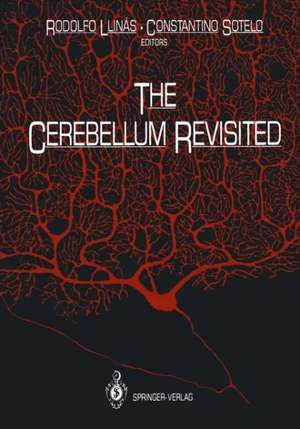The Cerebellum Revisited
Editat de Rodolfo Llinas, Constantino Soteloen Limba Engleză Paperback – 16 sep 2011
Preț: 789.52 lei
Preț vechi: 962.83 lei
-18% Nou
Puncte Express: 1184
Preț estimativ în valută:
151.08€ • 161.55$ • 125.96£
151.08€ • 161.55$ • 125.96£
Carte tipărită la comandă
Livrare economică 17 aprilie-01 mai
Preluare comenzi: 021 569.72.76
Specificații
ISBN-13: 9781461276913
ISBN-10: 1461276918
Pagini: 360
Ilustrații: XIII, 339 p.
Dimensiuni: 178 x 254 x 19 mm
Greutate: 0.66 kg
Ediția:Softcover reprint of the original 1st ed. 1992
Editura: Springer
Colecția Springer
Locul publicării:New York, NY, United States
ISBN-10: 1461276918
Pagini: 360
Ilustrații: XIII, 339 p.
Dimensiuni: 178 x 254 x 19 mm
Greutate: 0.66 kg
Ediția:Softcover reprint of the original 1st ed. 1992
Editura: Springer
Colecția Springer
Locul publicării:New York, NY, United States
Public țintă
ResearchDescriere
This book is organized into three parts that correspond with the main groups of chapters delivered during the Cajal Centenary Meeting on The Neutron Doctrine. These chapters represent important aspects of the morphology, development, and function of the cerebellum and related structures. Clearly an exhaustive analysis of all aspects of the cerebellar system, as they relate to the legacy of Ramon y Cajal, would be impossible to contain in just one volume, given its far-reaching impact. Instead, we deliberately steered away from the traditional handbook approach that some of us have taken in the past and selected those aspects of cerebellar research currently under vigorous study that would also represent the widest scope of interest for neuroscientists in general and for cerebellar specialists in particular. In particular, we felt that as the discrete anatomy of the cerebellum is quite well known, only certain aspects of the structure should be discussed here. For example, the organization of the pontocerebellar pathways, we felt, would be particularly interesting given the enormity of the system in higher vertebrates. Also of interest is the distribution and development of the synaptology and neurotransmitter properties in this cortex. Indeed, from the point of view of cerebellar development, this may represent one of the clearest paradigms in the understanding of rules for neurogenesis for the central nervous system.
Cuprins
1. Organization, Development, and Repair of the Cerebellar Circuits.- 1. Purkinje Cell Heterogeneity: Its Role in Organizing the Topography of the Cerebellar Cortex Connections.- 2. Zebrins: Molecular Markers of Compartmentation in the Cerebellum.- 3. Cerebellar Granule Cells and the Neurobiology of Excitatory Amino Acids.- 4. Microtubule-Associated Proteins in Cerebellar Morphogenesis.- 5. Cerebellar Grafting as a Tool to Analyze New Aspects of Cerebellar Development and Plasticity.- Light and Electron Microscopic Immunocytochemistry of Putative Neurotransmitter Amino Acids in the Cerebellum with Some Observations on the Distribution of Glutamine.- The Expanding Role of the Basilar Pontine Nuclei as a Source of Cerebellar Afferents.- 2. Electrophysiology of Purkinje and Inferior Olivary Neurons.- 8. The Electrophysiology of the Cerebellar Purkinje Cell Revisited.- 9. Voltage- and Transmitter-Gated Channels in Purkinje Cells from Organotypic Cerebellar Cultures.- 10. Electroneuronal Hybridization: A Novel Approach to Investigate Rhythmogenesis in the Inferior Olivary Nucleus.- 3. Electrophysiology of Movement.- 11. Cerebellar Control of Saccadic Eye Movements in the Pigmented Rat.- 12. A Possible Connection Between the Mossy and Climbing Fiber Systems at Precerebellar Level.- 13. Eye Movements and the Zonal Structure of the Rabbit Flocculus.- 14. The Dynamic Selection Hypothesis: A Proposed Function for Cerebellar Sagittal Zones.- 15. Cerebellar Output: Multiple Maps and Modes of Control in Movement Coordination.- 16. The Role of the Cerebellum in Voluntary and Reflexive Movements: History and Current Status.














